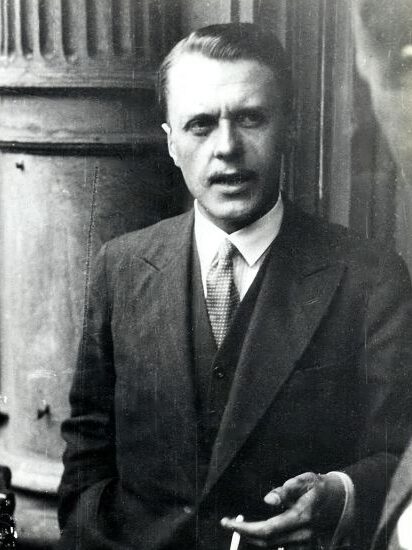Brentano, Bernard von
Writer
Born: October 15, 1901 in Offenbach/Main
died: December 29, 1964 in Wiesbaden
His parents were Otto von Brentano di Tremezzo, a politician of the Catholic Center Party and Hessian Minister of Justice, and Lilla, née Schwerdt, a great-granddaughter of Franz Brentano, a brother of Clemens and Bettine Brentano. Bernard's brother Heinrich became Foreign Minister of the Federal Republic of Germany. After completing his studies, Brentano became a journalist in Berlin, writing as a correspondent for the liberal-democratic "Frankfurter Zeitung" from 1925 to 1930. He had been friends with Bertolt Brecht since 1928, was involved in the "Bund proletarisch-revolutionärer Schriftsteller" (League of Proletarian-Revolutionary Writers) and represented left-wing positions in essays. In 1933, writers such as Johannes R. Becher and Heinrich Mann met in his apartment for advice. Brentano and his wife Margot decided to go into exile in Switzerland, where two sons were born in 1933 and 1935. In 1934, the family moved to Küsnacht, where Thomas Mann became their neighbor. Brentano wrote for "Weltwoche" and other Swiss newspapers and turned his back on communism. His first and most important successful novel "Theodor Chindler", which critically describes a Catholic middle-class family between 1914 and 1918, was published in Zurich in 1936, followed by other novels. As he saw himself as a German patriot, he traveled to Germany and in 1940 submitted an application to the Reichsschrifttumskammer to be allowed to live and publish in Germany again. It was not granted in full, and Brentano remained in Switzerland. His book on August Wilhelm Schlegel was published in Stuttgart in 1943, but was only allowed to be delivered to Switzerland. In the fall of 1945, Manuel Gasser, head of the arts section of "Weltwoche", accused him of having become "an enthusiastic advocate of National Socialism" after Hitler's victories in 1939/40 (Zuckmayer p. 266). However, Brentano won the ensuing libel suit in 1947.
Ernst Glaeser established contact with the publisher Max Niedermayer and Brentano moved to the Wiesbaden-based Limes-Verlag, which made his works available to readers in Germany. In 1949, he moved to Wiesbaden, where he had a house built in Bingertstraße. He became the center of a regulars' table where publishers and authors such as Friedrich Michael met on Thursdays at Café Blum. Brentano criticized the Allies and said that because Thomas Mann had attributed National Socialism to the German character, Germany was now less respected in the world than Italy and Japan. He published biographical works on Goethe and Marianne von Willemer (2nd ed. 1961) and on Sophie Charlotte and von Danckelmann (1949) as well as his memoirs (1952). In an essay entitled "Two centuries of intellectual life in Wiesbaden", he suggested erecting a monument to Marianne von Willemer in Wiesbaden. In 1951, he was a guest at the birthday party for Gottfried Benn at the Nassauer Hof. In his last years, the man who was described as ambitious, self-confident and choleric was marked by serious illness. He is buried in the cemetery in Wiesbaden-Sonnenberg. The extent to which Brentano's political about-turn is to be seen as a betrayal of his exile and affects his work is a subject of research today.
Literature
- Niedermeyer, Max
Pariser Hof. Limes-Verlag Wiesbaden 1945-1965, Wiesbaden 1965 (pp. 27-32).
- Michael, Friedrich
The Brentano table. In: Friedrich, Michael: As serious as cheerful. Betrachtungen, Erinnerungen, Episteln und Glossen, Sigmaringen 1983, first published in 1971 (pp. 149-152).
- Mann, Golo
Memories and thoughts. Years of apprenticeship in France. Hans-Martin Gauger and Wolfgang Mertz (eds.), Frankfurt a.M. 2002, first published in 1999 (pp. 135-138).
- Zuckmayer, Carl
Secret Report. Gunther Nickel and Johanna Schrön (eds.). Munich 2004, first Göttingen 2002 (pp. 79f. text and 263-269 commentary).
- Hessler, Ulrike
Bernard von Brentano (1901-1964). A German writer without Germany. In: Heidenreich, Bernd (ed.): Geist und Macht. The Brentanos, Wiesbaden 2000 (pp. 197-232).
